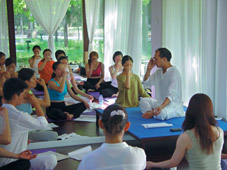Three years ago Mohan came to Beijing to teach yoga. Sitting upright, in his mid 30s, he projects a prudence and steadiness seemingly beyond his years. Yet his eyes seem to sparkle with an almost childlike sincerity.
Mohan's hometown, Rishikesh, known as the "world capital of yoga," is home to many schools and renowned masters. Mohan was first introduced to yoga at the age of 12, and he began to practice professionally under a master at 17. He went on to study the specialized discipline at three universities.
Life
Mohan came to China by accident. It was three years ago during a summer holiday when he was invited to teach yoga in Beijing and he fell in love with the city, he says. Before then, the little he knew of China was gleaned from books and in his imagination China was an ancient nation; conservative and exclusive. But soon after his arrival he discovered things were very different. The modern ambience, open-minded people and diverse culture exceeded his expectations. What's more, Mohan formed a strong attachment to Beijing. He relished in the city's melding of antiquity and modernity, and though he returned to India, soon he was back in Beijing teaching yoga to Chinese and Westerners alike.
As for the reason for the popularity of yoga in China, "China has taiji. Yoga and taiji go with the same principle and share a similar philosophy: to make harmony among body, breath and mind. In terms of this kind of similarity, Chinese people readily accept yoga. Especially for young people, Taiji is a little bit slower and yoga is more dynamic. In India, we also have some who teach and learn taiji," says Mohan.
Mohan's life in Beijing is simple and constant. Most of his time is occupied by yoga classes and lectures. A vegetarian, he enjoys Chinese cuisine, Sichuan food in particular, with its spiciness that reminds him of his hometown. "I like bean curd very much. There was no bean curd before in India, but now we have it, and it was Chinese people who took it there." Mohan never drinks anything alcoholic and never goes to bars. So what strikes his fancy is not the prosperous and bustling bar streets of Beijing. "I am fond of Beijing's historic places which are the mirror of ancient civilization. Beijing is a huge city and you can experience much of China in this one city.
Mohan's love for China partly stems from his students. "Chinese students are curious and hard-working. Although yoga has a time-horned history in India, it is something new in China. They start practicing yoga from a base of no knowledge, so they ask many questions in great detail. I feel that they learn yoga by using their hearts, just like my Indian students.”
As an Indian in China, Mohan has experienced the hospitality and helpfulness of the Chinese people. "I feel a connection with my students. They are considerate and cooperative. When I first moved to Beijing I had to rent an apartment. My students worried I would have problems with communication, so they provided housing information and helped me find a nice apartment. They are very helpful." Mohan’s gratitude is expressed not only in his words, but also on his face.
And Mohan sometimes plays the role of goodwill ambassador. "In early October, we organized our students to have a yoga trip to India. We could not get the tickets to India because now so many Chinese are traveling there. Still I am very happy to see that, although our schedule was to be postponed."
As for future plans, Mohan offers a definitive answer "I will teach yoga in China. I will visit other countries for a couple of weeks on holidays," says Mohan with a shy smile. "I feel most at home in China."
(China Pictorial 11/2006)



